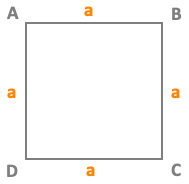Area of a square |

|
|
|
|
A side of the square = a AB = BC = CD = DA ExampleABCD is a square with side a = 5 cmArea A of the square ABCD = a x a = 5 x 5 = 25 cm² Calculate the area of a square |
Definition of a squareA square is a plane figure with four equal sides and four right (90°) angles.A square is a quadrilateral that has 4 sides of the same length and 4 right angles. A square is a four-sided figure whose sides are all the same length and whose angles are all right angles measuring 90 degrees. The area of a square is equal to the product of the length of one side. Area of a square is equal to side times side. Since each side of a square is the same, it can simply be the length of one side squared. Properties of a squareA square has its diagonals of the same length, which intersect in their middle and are perpendicular.A square has its opposite sides two by two parallel. The diagonals of a square bisect each other at 90°. The length of the diagonals of a square is equal. The sum of all interior angles of a square is 360°. All four sides of the square are equal to each other. The opposite sides of a square are parallel to each other. A square is a rectangle with four equal sides. All squares are parallelograms, rectangles and rhombi. But not all parallelograms, rectangles and rhombi are squares. A square has 4 sides and 4 vertices. The plural of vertex is "vertices". Vertex means a corner or a point where lines meet. "Vertex" is a synonym for a node of a graph. A vertex of a graph is one of the objects that are connected together. To go furtherA square is a quadrilateral, as it has 4 sides and 4 angles.A square is a rectangle. Indeed it has 4 right angles. A square is a rhombus. Indeed it has its 4 equal sides. Since the sides of a square are parallel, a square is a parallelogram. Perfect squareA perfect square is a number made by squaring a whole number. Perfect squares are numbers that are obtained by squaring a whole number or an integer. A perfect square is an integer which is the square of another integer n, that is n2. Since a negative times a negative is positive, a perfect square is always positive. Perfect squares are numbers that are squares of integers. A negative integer times a negative integer equals a positive integer.Examples of perfect squares1 = 1 x 1 = 124 = 2 x 2 = 22 9 = 3 x 3 = 32 16 = 4 x 4 = 42 25 = 5 x 5 = 52 36 = 6 x 6 = 62 49 = 7 x 7 = 72 64 = 8 x 8 = 82 81 = 9 x 9 = 92 100 = 10 x 10 = 102 121 = 11 x 11 = 112 144 = 12 x 12 = 122 169 = 13 x 13 = 132 196 = 14 x 14 = 142 225 = 15 x 15 = 152 256 = 16 x 16 = 162 289 = 17 x 17 = 172 324 = 18 x 18 = 182 361 = 19 x 19 = 192 400 = 20 x 20 = 202 441 = 21 x 21 = 212 484 = 22 x 22 = 222 529 = 23 x 23 = 232 576 = 24 x 24 = 242 625 = 25 x 25 = 252 |